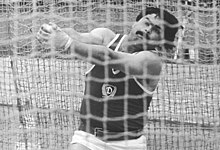Detlef Gerstenberg
Detlef Gerstenberg (born March 5, 1957 in Stalinstadt ; † January 24, 1993 in Berlin ) was a German athlete who was fifth in the 1980 Olympic hammer throw .
Gerstenberg won the title at the Junior European Championships in 1975 with 70.08 m. In May 1976 the athlete from SC Dynamo Berlin set a junior world record with 71.74 m. Gerstenberg never won a GDR championship title; In 1978, 1980 and 1982 he took second place behind Roland Steuk . At the European Championships in Prague in 1978 , Jurij Sedych from the Soviet Union won with 77.28 m in front of the German throwers from East and West. Roland Steuk won silver, four centimeters behind Sedych, Karl-Hans Riehm from the Federal Republic of Germany received bronze for 77.02 m and Gerstenberg placed fourth with 76.70 m ahead of Manfred Hüning from the Federal Republic of Germany.
At the 1980 Olympic Games , the West German throwers did not take part because of the Olympic boycott . The expected duel between the throwers from the USSR and the GDR was very one-sided, however, because Sedych won ahead of his teammates Sergei Litwinow and Juri Tamm . Almost one and a half meters behind Tamm, Steuk was fourth, Gerstenberg was in fifth with 74.60 m over four meters behind Tamm. At the European Championships in Athens in 1982 , all three medals again went to Soviet throwers, Detlef Gerstenberg took sixth place with 75.32 m, making him the best German.
Gerstenberg threw three GDR records in his career. In 1980 he replaced the record man with 78.94 m steels. In 1983 it was surpassed by Ralf Haber . On May 5, 1984 Gunther Rodehau was the first GDR thrower to throw over the 80-meter mark, but Gerstenberg replaced him after 19 days with 80.26 m as the GDR record holder and improved on July 15, 1984 to his best distance of 80.50 m. In June 1985 Gerstenberg was replaced as GDR record holder by Matthias Moder .
Detlef Gerstenberg died at the age of 35 of cirrhosis of the liver and a corroded pancreas. In the documents on state doping in the GDR that became public after the fall of the Wall , the name of Gerstenberg was also found among the doped athletes. According to doping expert Werner Franke , his death can be explained not only by alcohol consumption, but also by anabolic doping .
literature
- Klaus Amrhein: Biographical manual on the history of German athletics 1898–2005 . 2 volumes. Darmstadt 2005 published on German Athletics Promotion and Project Society
Web links
- Athlete portrait of Detlef Gerstenberg ( memento from November 13, 2012 in the web archive archive.today ) at the IAAF (English)
- Detlef Gerstenberg in the Sports-Reference database (English; archived from the original )
Individual evidence
- ^ Brigitte Berendonk : Doping. From research to fraud . Reinbek 1992, ISBN 3-499-18677-2 , p. 181
- ↑ Frank Bachner: Schnell wie der Tod , Tagesspiegel of September 22, 1998, accessed on November 26, 2014
| personal data | |
|---|---|
| SURNAME | Gerstenberg, Detlef |
| BRIEF DESCRIPTION | German athlete |
| DATE OF BIRTH | March 5, 1957 |
| PLACE OF BIRTH | Stalin city |
| DATE OF DEATH | January 24, 1993 |
| Place of death | Berlin |
